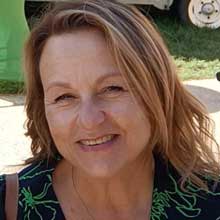What do you teach at Ca’ Foscari? What are your main research interests?
I teach in the Analytical Chemistry Laboratory (2nd year, 1st term) and support the co-workers in my group in other analytical chemistry laboratories. My interests have always been transports and pollutant dispersion in the environment, and the detection of these pollutants with analytical methods, in order to design tailor-made monitoring plans that can provide answers to problems involving the health of citizens and the environment.
Tell us about your academic path.
After graduating from high school in Venezuela, I enrolled in Biology at the University of Florence. Later, also in Florence, I started my PhD in Environmental Sciences, focusing on the distribution of pollutants and natural substances at the water-air interface. I had the chance to do part of my PhD project at the Max-Planck-Institut für Kolloid- und Grenzflächenforschung in Berlin (D), under the guidance of Dr. Reinhard Miller. This research led to the on-site study of surface film on water bodies and the development of two prototypes (MUMS and SESAMO) for its sampling (UNIFI, PNRA, UNIVE, CNR-ISSIA). Since 2011, I have been a researcher at the Department of Molecular Sciences and Nanosystems and have started my career on a strategic issue concerning the study and development of electroanalytical methods for the detection of environmental pollutants.
What are your professional references?
I must say that I am inclined to listen to people who bring something to the table that enables me to have a broader view of facts, to think about them. Looking back, I can certainly mention Professor Renato Cini, Professor of Physical Chemistry at the University of Florence, and my colleague at the beginning of my career, Dr. Nicoletta Degli Innocenti. They were the first people I met on my journey, who taught me a lot and with whom I shared a part of my path. I will always carry them with me. Today, my professional references in the Department of Molecular Sciences and Nanosystems are all those co-workers with whom I can work, think and understand. In short, to continue building something, not only for my own benefit, but also for the benefit of our main users, the students, at whatever level they may be.
Have you always known that this was going to be your path?
Yes, I have always thought so, despite the difficulties, hardships and moments of hesitation I encountered along the way, before and after my arrival in the Department of Molecular Sciences and Nanosystems. I felt it many times and it has been a reason to think about it with myself and with those who share my conviction. I think we do the best job in the world, despite the difficulties along the way. I felt it many times: while I was sampling at sea or in the lagoon; while I was working in the laboratory, even on weekends or late at night; while I was working in Antarctica, Berlin, Florence, Venice, Barcelona, Modena, Padua, etc.; when I met new people and new sources of inspiration.
Can you offer any advice to researchers in the early stages of their career?
I say do it with knowledge and conviction and that there may be tough times, but also times of achievement and growth. That there will be lonely moments, but also moments overcrowded with people and ideas, where we must learn to look at them and choose. I say look at where you work, at the experience and helpfulness of those who follow us, think about your actions, act rigorously and thoughtfully, weigh up every aspect of your work. I say remember that behind every person, even the most disagreeable to us, there is a story. In short, work rigorously and constantly, without forgetting the human side. Let me summarise with a thought: sailors, during storms, ‘lie to’, i.e. keep the ship's position, with the engines idling, during bad weather. Sooner or later the bad weather will be over, and we have to be ready to sail again with a good 'Full speed ahead'.

